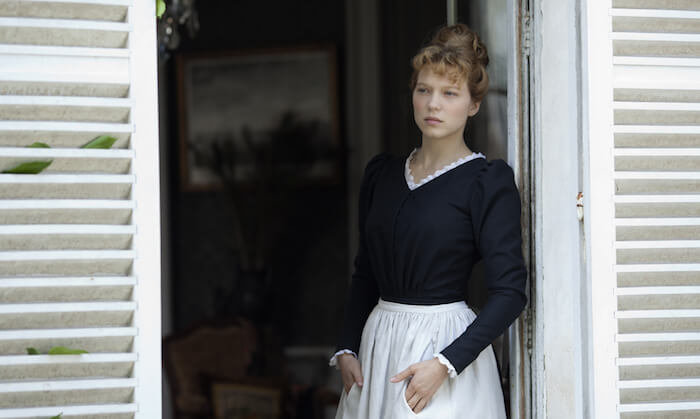“Poor Little Slave”: Diary of a Chambermaid


Directed by Benoît Jacquot
Opens June 10 at Lincoln Plaza
There’s perverse pleasure in defiling beauty; thus Benoît Jacquot’s Diary of a Chambermaid, set in a luminous French countryside peopled with carefully costumed snobs, hypocrites, anti-Semites and thieves. “Costumed” not because they make much effort to conceal their sins, but because this is a period piece; Jacquot’s quick and vicious version is the fourth screen adaptation of French writer Octave Mirbeau’s 1900 novel, Le Journal d’une femme de chamber. Mirbeau took a gloomy stance regarding contemporary society; his heroine, Célestine, is both intelligent and unforgiving, disgusted by her employers but by no means above manipulating or humiliating them right back. The great and underlying problem, in fact, is that she has no means; Jacquot makes it clear that Célestine’s options are limited to domestic and sexual servitude, which aren’t even mutually exclusive.
Léa Seydoux’s acerbic Célestine travels from Paris to her new assignment with Madame et Monsieur Lanlaire, who already employ a brutal gardener, Joseph (Vincent Lindon), and a hard-drinking cook. The film (shot by Romain Winding, edited by Julia Gregory) moves briskly through gardens, decaying servants’ quarters, and provincially elaborate interiors, tracking Madame’s cruelty to subordinates, Monsieur’s preying on female staff, and Joseph’s genocidal ideas about the Jews. A series of flashbacks, meant to shade in the blanks of Célestine’s life, present her least exploitative assignment as a period spent caring for a tubercular young man, whose apparent love for her doesn’t preclude him from noting that she’ll “always be a poor little slave”—below him in the natural order, even though she’s likely to outlive him.
Renoir and Buñuel dealt with this material in 1946 and 1964, each solving Célestine’s problem differently; Renoir had Paulette Godard wed the young, ailing scion of the bourgeoisie, while Buñuel put Jeanne Moreau into the bed and will of the Lanlaires’ repellent neighbor; her new husband brings her breakfast while she lounges, looking a little dead-eyed. Jacquot reverts to the novel’s original ending, and has Célestine succumb to a sexual obsession of a sort, but it’s unclear whether sex here is a symptom (as in Buñuel) of deep social malaise, or its source, or merely a fun thing to shoot and show. How else to explain that the most hideous crime takes place off-screen, but we get a peek of (unintentional, whoops) congress with a corpse?
You might also like 




















